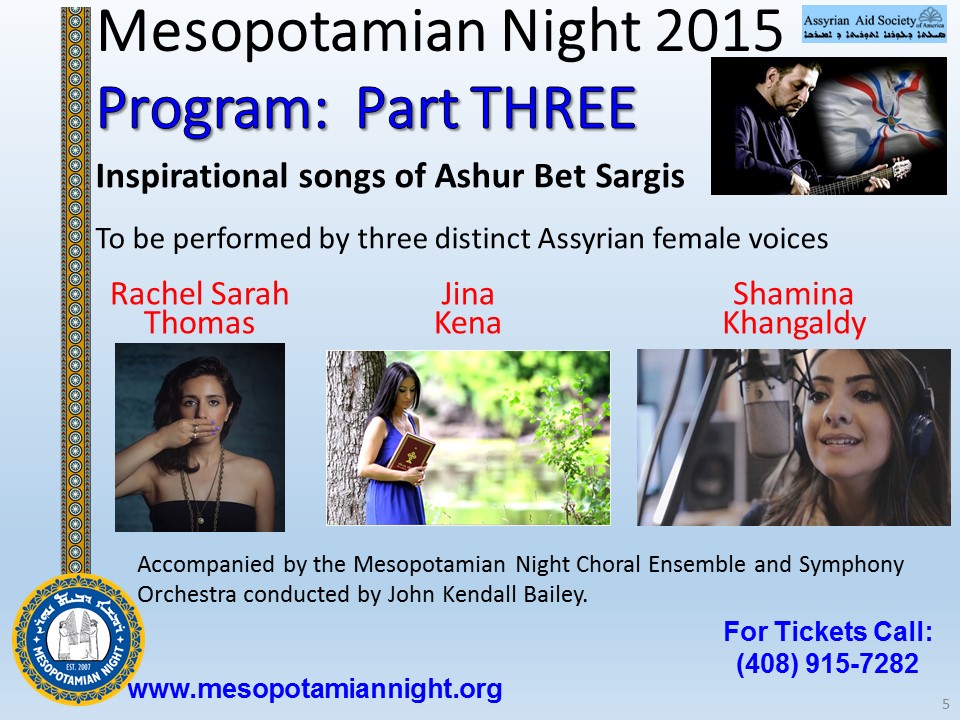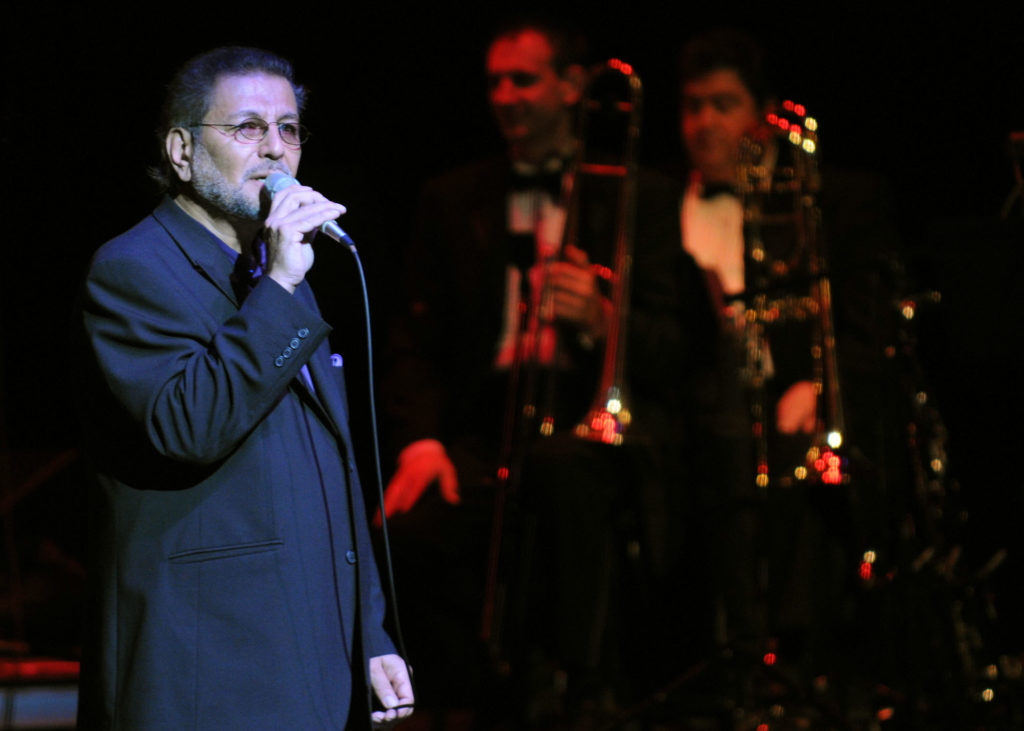
Three of the most distinct Assyrian female voices singing the most inspirational songs of the living legend Ashur Bet Sargis. Having hand picked the songs himself, Ashur offers his perspective on solidarity, nationalism, and the continuation of hope through his lyrics. He is not only one of the most popular Assyrian singers, but also one of our most brilliant lyricists. In addition, this past year amidst the struggles of our people in Iraq and Syria with ISIS, Ashur made several trips to the home land to give first hand accounts of the struggle and assist in providing humanitarian aid to those in need.

Ashur Bet Sargis was born in July, 1949 in Baghdad, Iraq. At the adolescent age of fourteen, he started playing the organ at the local Assyrian church with a youth group called “Challish”. His first musical breakthrough happened when he was asked by a local Assyrian music band, “Ankidu,” to join them as their guitar player.
Under the influence of established Assyrian musicians such as Evin Aghassi and King Biba (Edward Yousif), as well as western artists, in the late 1960s Ashur began composing nationalistic songs that have since become classics of modern Assyrian music. As Ashur recalls of his early days in the biography written for his 4-CD set “So far” (2003):
“Music was being redefined out in the rest of the world, and stars like Elvis, Paul Anka, and of course The Beatles were shining all over the place. I wanted to be a part of this transformation, and offer its fruition to my people.”
Shortly after the Ba’ath led revolution of 1968, Ashur fled the unstable political situation in Iraq in 1969. After one year staying in Lebanon, he arrived in the USA fall of 1970 and made Chicago his new home. As the word of his arrival quickly spread, his aspiration began to look up. He began to tour the United States, from one coast to another, as did his revolutionary lyrics, entering every home in Diaspora, calling for a national awakening among the Assyrians in reminiscence of their forgotten homeland.
This was also the precise time during which Ashur met his hero at the time, the late William Daniel, a gifted poet, writer and musician. William Daniel was not only to become an inspiration to the young Ashur, but as the two became more acquainted; Ashur was able to immerse much deeper into his music as he learned how to be in touch with his compassionate side. Ashur recalls William Daniel telling him, “You can contribute much more to the greatness of music if you make one worthwhile song instead of ten filters here and there.”
The year was 1971 when Ashur, along with four other musicians’s, established the music group, “East Bird Band,” soon releasing Ashur’s first album, making Ben Malko’s “Bet Nahren Atrewat,” Ashur’s first hit. After a sold-out party on the eve of 1973 in Los Angeles, Ashur enjoyed the city and made it his new home.
The very first Assyrian secular LP (Long Play) was release by Ashur in 1975 titled “Ashur Sargis Sings for Ancient Assyria”. The album contained nationalistic songs like “Roosh Jwanqa – written by Fraydon Aturaya” and “Bet Nahren Atrewat” as well as several other songs that have since become staples of his catalogue and concerts.
In 1976, Ashur became the first Assyrian singer to be invited by the Assyrian community from overseas when he played three sold-out shows in Australia. His next stop was Iran, where he took the stage at Eveen Hotel in Tehran. Two weeks after he returned to Los Angeles to record his third album “Sing Me A Lullaby” that was released in 1978.
In 1984, Ashur released his album “Dance of Victory” and began touring. However, things came to a halt as Ashur hit an artist block as his personal life required more attention at that time. Ashur relocated to Michigan and reduced his stage performances to concentrate on his family life. It wasn’t until 1988, when Ashur moved back to California, settling in Modesto, that he was ready to perform again and released the album “Powkha D’ Sitwa” in 1990.
As Ashur continued to perform for the next few years, he could sense the shift of energy that was taking place within him. Ashur decided to delve into his inner self in order to brand his lyrics with a just cause to symbolize the much deserved attention of the armed struggle of the Assyrian Democratic Movement (ZOWAA), an Assyrian national uprise that was taking place in Iraq. His follow up album, “Proukh Rama Ya Nishra,” in 1992 became a well known nationalistic medley. In 1995, his flawless music resulted in the release of “Nora Aldeyana.” One year later Ashur released yet another album, “Ana Lewin Min Daha Dounyeh.” Ashur was on top of the Assyrian music charts once again.
A dream of visiting his motherland was fulfilled for Ashur in 1997 when he travelled for two weeks to Northern Iraq. He was greeted by members of the Assyrian Democratic Movement (ZOWAA), and later escorted to the city of Nohadra (Dohuk). He visited almost every village, town, and city and performed in five concerts, thousands of fans came to hear and see him. Upon his return from Iraq, Ashur was truly a transformed man.
In 1999, he released his ninth album, “Immortal Memories,” a collection of his classic love songs, handpicked and newly performed by Ashur himself. Thousands of copies made their way into Assyrian homes across the globe.
Ashur decided it was time once again to visit his motherland as he made another trip to Iraq in 2005. That trip would inspire Ashur to visit his homeland every year to share in the Aketo festivities for Kha’b Nissan.
“Dashta d’Nineveh” was the next album released in 2009 featuring twelve new songs with music and lyrics written by Ashur. He had poured his heart and soul into this new album that unsurprisingly be named as the 2008 “Best Album of the Year” by Qeenatha.com. In August 2008, Ashur performed at the Assyrian Aid Society of America “2nd Annual Mesopotamian Night” at the famous Gallo Center for the Arts” in Modesto, California. At that historical concert, Ashur shared the stage with some of the best Assyrian musicians and some 20 plus instrument orchestra. Few months later, Ashur was presented with the 2009 “Best Lifetime Award” at the first annual Syriac Music Awards. In Nov. 2012, another great highlight for Ashur was performing again in a live concert at the Alex Theatre in Los Angeles.
In June of 2014, following the siege of and the toppling of Mosul’s governante at the hands of the militants of the Islamic State of Iraq and Syria (“ISIS”), Ashur rushed to be at the side of his people, where an estimated 120,000 fled their homes, becoming displaced and homeless, instantaneously, and whose dyer needs from pharmaceutical to housing were met, and whose reestablishment in Iraq’s northern region was facilitated. Since then, Ashur has traveled several times to study the circumstances of the Ninevites and to help bridge their essential needs with world humanitarian aid organizations.
Compiled and edited by Sargon Alkurge, July 13, 2015.
Sources
1) Moneer Cherie for Qeenatha.com
2) “ASHUR BETSARGIS” autobiography by Helen Talia, Nov. 2012, updated July 2015
